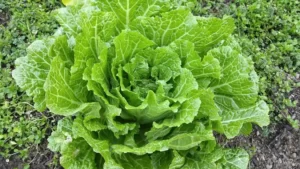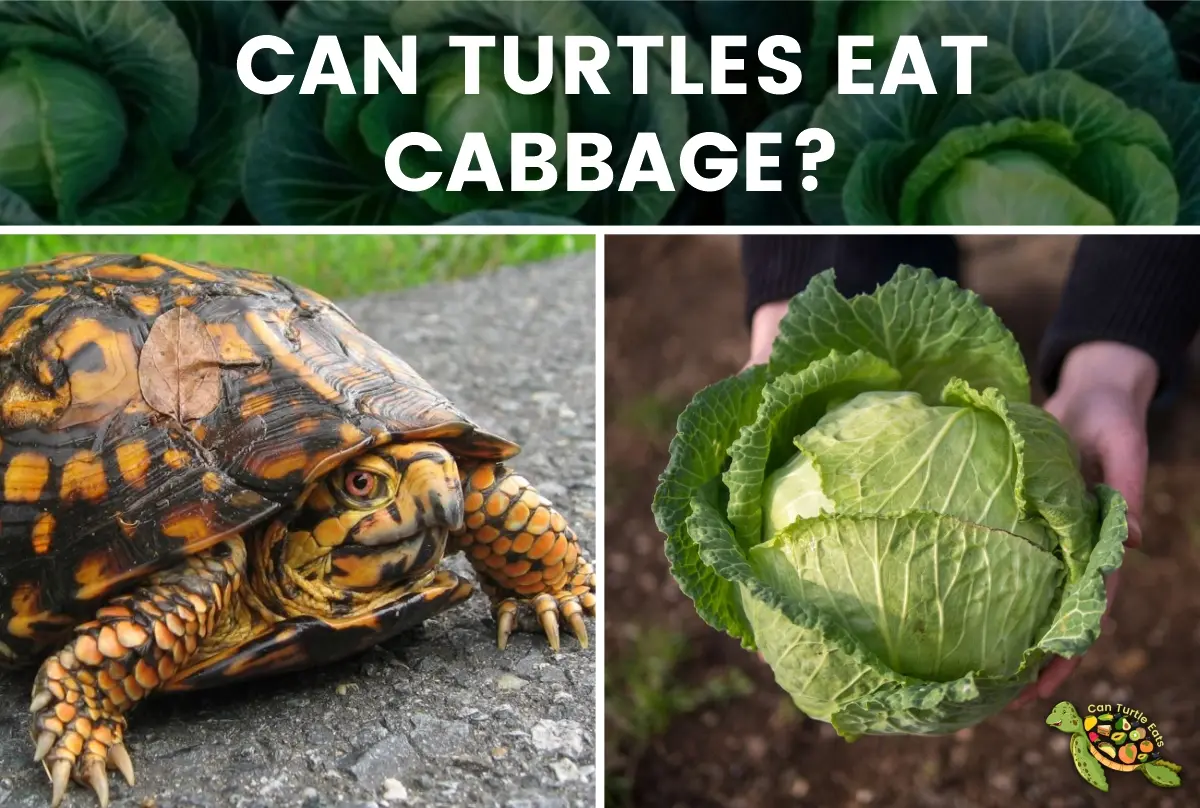Can turtles eat cabbage? Yes, turtles like to eat cabbage as a delicious dish. Turtles are omnivores and their diet can include a variety of plant and animal-based foods. Cabbage is a leafy vegetable that is commonly consumed by humans, but can turtles eat cabbage too? The answer is yes, turtles can eat cabbage, but it should be given to them in moderation as part of a balanced diet.
Cabbage is a good source of nutrients like vitamin C, and K, and fiber, which can benefit turtles. However, it is also high in oxalic acid, which can interfere with calcium absorption in turtles and lead to health problems like metabolic bone disease. Therefore, it’s important to offer cabbage sparingly and in small amounts.
When feeding turtles cabbage, it’s best to wash it thoroughly and remove any outer leaves that may contain pesticides or other harmful chemicals. Cabbage can be offered raw or cooked, but it’s important to avoid seasoning it with salt, butter, or other additives that can be harmful to turtles.
In conclusion, while turtles can eat cabbage, it’s important to offer it in moderation and as part of a varied diet that includes other leafy greens, vegetables, and proteins.
List of cabbage turtles can eat:
Turtles can eat several types of cabbage as part of a varied and balanced diet.
Here is a list of cabbage types that turtles can eat:
- Napa cabbage
- Savoy cabbage
- Red cabbage
- Purple Cabbage
- Green cabbage
- Bok choy cabbage
- Brussels sprouts (a type of cabbage)
- Chinese cabbage
- Cauliflower (not a cabbage but a member of the same family)
- Broccoli (not a cabbage but a member of the same family)
Nutrition Value Of Cabbage For Turtles:
Cabbage is a leafy vegetable that is low in calories and high in nutrients. It contains vitamins like vitamin C, K, and B6, and minerals like calcium, potassium, and magnesium. Cabbage is also a good source of fiber, which can benefit the digestive health of turtles.
Nutrition Expert Turtle Diet Plan With Cabbage:
A nutritionally balanced turtle diet should consist of 50-75% vegetables, including leafy greens like cabbage. The remaining 25-50% can be made up of protein sources like insects, fish, or commercial turtle pellets.
Here’s a sample turtle diet plan that includes cabbage:
- 50% dark leafy greens: kale, collard greens, dandelion greens, mustard greens, spinach, and cabbage.
- 25% other vegetables: carrots, squash, zucchini, bell peppers, and cucumber.
- 15% protein: commercial turtle pellets, crickets, mealworms, and fish (like shrimp or tilapia).
- 10% fruits: strawberries, blueberries, raspberries, and papaya.
This diet plan provides turtles with a variety of nutrients and a balanced ratio of vegetables, protein, and fruits.
How To Feed Cabbage To Your Turtle?
When feeding cabbage to your turtle, it’s important to offer it in small amounts and as part of a varied diet.
Here are some tips on how to feed cabbage to your turtle:
- Wash the cabbage thoroughly: Rinse the cabbage under running water to remove any dirt or debris. It’s important to wash the cabbage well, especially if it’s not organic.
- Remove any outer leaves: Remove any outer leaves that may be tough or damaged. These leaves may contain pesticides or other harmful chemicals.
- Chop the cabbage into small pieces: Chop the cabbage into small, bite-sized pieces that are easy for your turtle to eat. You can also shred the cabbage into small pieces if your turtle prefers.
- Offer the cabbage raw or cooked: Cabbage can be offered raw or cooked, depending on your turtle’s preference. If you’re offering raw cabbage, be sure to chop it into small pieces to make it easier for your turtle to eat. If you’re cooking the cabbage, steam it until it’s soft and then chop it into small pieces.
- Feed in moderation: Cabbage should be offered to turtles in moderation, no more than once or twice a week. Too much cabbage can cause health problems like metabolic bone disease due to the high oxalic acid content.
- Offer a variety of vegetables: Cabbage is a great addition to a turtle’s diet, but it’s important to offer a variety of vegetables to ensure your turtle gets all the nutrients they need. Other vegetables that can be included in a turtle’s diet include kale, collard greens, and dandelion greens.
How Often To Feed Cabbage To Your Turtle?
Cabbage should be offered to turtles in moderation, no more than once or twice a week. A varied diet is important for a turtle’s health, so be sure to include other vegetables and protein sources in their diet.
Pros And Cons Of Feeding Cabbage To Your Turtle:
Pros:
- Cabbage is a low-calorie, nutrient-dense food that can benefit a turtle’s health.
- It’s a good source of vitamins and minerals that turtles need to stay healthy.
- Cabbage is a good source of fiber, which can benefit a turtle’s digestive health.
Cons:
- Cabbage is high in oxalic acid, which can interfere with calcium absorption and lead to health problems like metabolic bone disease if fed in excess.
- Cabbage should be given to turtles in moderation and as part of a varied diet.
Expert’s Tip On Feeding Cabbage To Turtles:
“Feeding turtles a varied diet is important for their health and wellbeing. While cabbage can be a nutritious addition to a turtle’s diet, it should be offered in moderation and as part of a balanced diet that includes other vegetables and protein sources.” – Dr. Susan Donoghue, Veterinarian.
Can Turtles Eat Green Cabbage?
Yes, turtles can eat green cabbage. Green cabbage is a safe and healthy vegetable for turtles to eat as it contains many nutrients, including vitamins and minerals, that are beneficial to their health. It’s important to offer green cabbage in moderation and as part of a varied diet that includes other vegetables, protein sources, and fruits.

Can Turtles Eat Napa Cabbage?
Yes, turtles can eat napa cabbage. Napa cabbage, also known as Chinese cabbage, is a safe and healthy vegetable for turtles to eat. Like other types of cabbage, napa cabbage contains many vitamins and minerals that are beneficial to a turtle’s health. When feeding napa cabbage to your turtle, be sure to wash it thoroughly and remove any outer leaves that may contain harmful chemicals. Chop the napa cabbage into small pieces that are easy for your turtle to eat and offer it in moderation as part of a varied diet.

Can Turtles Eat Cabbage? Which Specie Can And Cannot:
Find out whether the following species can eat cabbage or not:
Can Aquatic Turtles Eat Cabbage?
Yes, aquatic turtles can eat cabbage. Cabbage is a safe and healthy vegetable for turtles to eat, as it contains many vitamins and minerals that are beneficial to their health. When feeding cabbage to aquatic turtles, be sure to offer it in moderation and as part of a varied diet that includes other vegetables, protein sources, and fruits.
Can Baby Turtles Eat Cabbage?
Yes, baby turtles can eat cabbage. Cabbage is a safe and healthy vegetable for baby turtles to eat, but it should be offered in moderation and as part of a varied diet that includes other vegetables, protein sources, and fruits.
Can Snapping Turtles Eat Cabbage?
Yes, snapping turtles can eat cabbage. Cabbage is a safe and healthy vegetable for snapping turtles to eat, but it should be offered in moderation and as part of a varied diet that includes other vegetables, protein sources, and fruits.
Can Painted Turtles Eat Cabbage?
Yes, painted turtles can eat cabbage. Cabbage is a safe and healthy vegetable for painted turtles to eat, but it should be offered in moderation and as part of a varied diet that includes other vegetables, protein sources, and fruits.
Can Yellow-Belly Turtles Eat cabbage?
Yes, yellow-belly turtles can eat cabbage. Cabbage is a safe and healthy vegetable for yellow-belly turtles to eat, but it should be offered in moderation and as part of a varied diet that includes other vegetables, protein sources, and fruits.
Can Water Turtles Eat Cabbage?
Yes, water turtles can eat cabbage. Cabbage is a safe and healthy vegetable for water turtles to eat, but it should be offered in moderation and as part of a varied diet that includes other vegetables, protein sources, and fruits.
Can Musk Turtles Eat Cabbage?
Yes, musk turtles can eat cabbage. Cabbage is a safe and healthy vegetable for musk turtles to eat, but it should be offered in moderation and as part of a varied diet that includes other vegetables, protein sources, and fruits.
Can Box Turtles Eat Cabbage?
Yes, box turtles can eat cabbage. Cabbage is a safe and healthy vegetable for box turtles to eat, but it should be offered in moderation and as part of a varied diet that includes other vegetables, protein sources, and fruits.
What kind Of Other Vegetables Can Turtles Eat?
Turtles can eat all types of vegetables such as celery, cherry tomatoes, tomatoes and etc.
FAQs
Can Turtles Eat Cabbage?
Yes, turtles can eat cabbage. Cabbage is a safe and healthy vegetable for turtles to eat as it contains many vitamins and minerals that are beneficial to their health. However, it should be offered in moderation and as part of a varied diet that includes other vegetables, protein sources, and fruits.
Can Turtles Eat Cabbage All Day?
No, turtles should not eat cabbage all day. While cabbage is a safe and healthy vegetable for turtles to eat, it should be offered in moderation and as part of a varied diet. Eating too much cabbage can cause health problems, such as metabolic bone disease, due to the high oxalic acid content.
Can Turtles Eat Cabbage Every Day?
No, turtles should not eat cabbage every day. While cabbage is a safe and healthy vegetable for turtles to eat, it should be offered in moderation and as part of a varied diet that includes other vegetables, protein sources, and fruits. Eating too much cabbage can cause health problems, such as metabolic bone disease, due to the high oxalic acid content.
Conclusion:
In conclusion, cabbage is a safe and healthy vegetable for turtles to eat. It contains many vitamins and minerals that are beneficial to their health, and it can be included as part of a varied diet that includes other vegetables, protein sources, and fruits. However, it should be offered in moderation as eating too much cabbage can cause health problems such as metabolic bone disease.
- Can Turtles Eat Mondo Grass? Unveiling the Munching Secrets - 13 January 2024
- Can Turtles Eat Portobello Mushrooms? Mushrooms on the Menu - 11 January 2024
- Can Turtles Eat Lizard Eggs? Beyond Greens - 10 January 2024

